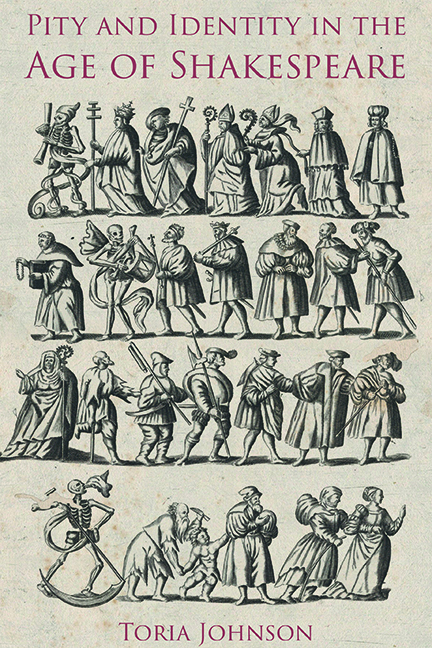Book contents
- Frontmatter
- Dedication
- Contents
- Acknowledgements
- Textual Note
- Introduction
- 1 ‘My name is Pity’: Mediated Emotion and King Lear
- 2 Violent Spectacle and Violent Feeling in Early Modern Lucrece Narratives
- 3 Dramatic Reworkings of Poetic Pity
- 4 Theorising Humanity Through Pity
- Conclusion
- Bibliography
- Index
- Miscellaneous Endmatter
3 - Dramatic Reworkings of Poetic Pity
Published online by Cambridge University Press: 07 October 2022
- Frontmatter
- Dedication
- Contents
- Acknowledgements
- Textual Note
- Introduction
- 1 ‘My name is Pity’: Mediated Emotion and King Lear
- 2 Violent Spectacle and Violent Feeling in Early Modern Lucrece Narratives
- 3 Dramatic Reworkings of Poetic Pity
- 4 Theorising Humanity Through Pity
- Conclusion
- Bibliography
- Index
- Miscellaneous Endmatter
Summary
‘COMMEND THAT PITY I COULD NEVER FIND’
The real-life exchange between Sir George Rodney and Frances Howard is a rich and multi-faceted story that ends, tragically, with a rejected love suit and Rodney's death by suicide. There is much to discover in this history – about social power, gender politics, and the early modern marriage economy – but it is also a story about the English lyric tradition, poetic cliché, generic boundaries, and the seemingly impossible distance between feeling overwhelming emotion and adequately expressing it. Rodney had courted Frances Howard in the period between her first and second marriage, between 1599 and 1601. In 1601, after she had married another man, the Earl of Hertford, the bereft Rodney followed the newlyweds to Wiltshire, and ended up in a very brief poetic exchange with the Countess. The first and longer of the two poems he wrote to her, called the ‘Elegia’, closes with these thoughts:
Fair, do not fret, nor yet at all be moved,
That I have thus unfortunately loved,
[…]
Yet, if you have a thought to cast away,
Cast it on me, and so you shall repay
My service with some ease; and I, in mind,
Commend that pity I could never find.
Thus ever be as you were ever fair.
Rest you in much content, I in despair.
Nothing that Rodney says here or elsewhere in the ‘Elegia’ is particularly inventive or surprising, and in fact it is precisely this lack of originality that has driven the critical response to his work. As Eric Langley puts it, the ‘Elegia’ reads simply as ‘one hundred and forty-two lines of stock Petrarchan verse’. Situated comfortably within the conventional bounds of the complaint lyric and the love sonnet, Rodney's work has, Langley observes, ‘not a thought in it unique, not a turn of phrase that may not be found frequently’ amongst the better-known examples of these genres. Like its language patterns, the emotional strategy of the ‘Elegia’ is equally recognisable for its adherence to generic convention.
- Type
- Chapter
- Information
- Pity and Identity in the Age of Shakespeare , pp. 117 - 152Publisher: Boydell & BrewerPrint publication year: 2021

